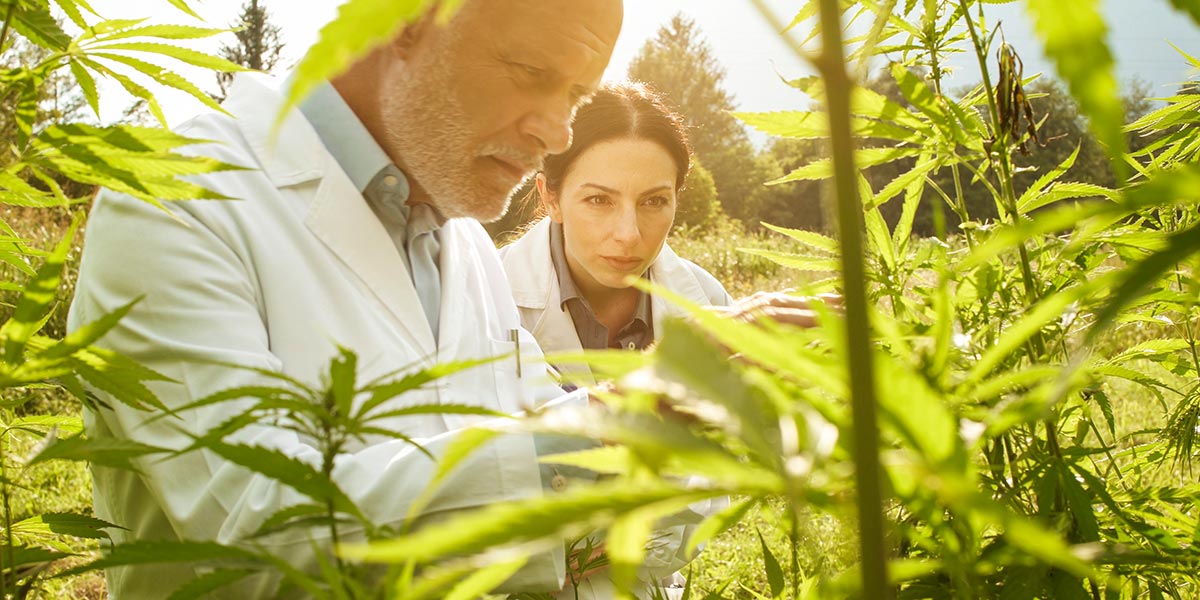At Kaycha Labs, we know how important it is for all Cannabis and Hemp products to be thoroughly, accurately, and efficiently tested to ensure consumers get the highest quality products. Since Hemp was first legalized under the Farm Bill in 2018, the need for consumers to access accurate information regarding their Hemp and Cannabis products has only increased. Now, more and more states are incorporating Hemp in their products, making it more critical than ever to ensure that the plants being grown and manufactured meet the standards set forth by states and federal guidelines. For best results and to comply with health and safety guidelines, it is best to test the plant during all phases, including the growth period, to ensure proper procedures are being met before processing and manufacturing.
The Cannabis plant contains over eighty different naturally-occurring compounds known as cannabinoids. Each plant is grown to produce varying cannabinoids of either THC or CBD depending on the desired outcome. Multiple factors come into play regarding Hemp testing, the first being the federal regulations placed on the plant. In the United States, THC’s level must remain below 0.3% for a plant to be categorized as Hemp. Thus, thorough testing must occur throughout the entire growing period to ensure that the plant meets federal guidelines before continuing to the processing and manufacturing phase. With adequate testing taken in the early stages of the plant’s life, the likelihood of being safe for consumers when it gets to the manufacturer is even greater. To provide consumers with the utmost safety, thorough testing procedures must occur, and it begins at the farm.
Hemp Testing Timeline
All growers must comply with state regulations when growing Hemp and Cannabis plants. If a grower’s plant tests above the legal limit for its THC level, the state will have them destroy the entire crop. This would not only set growers back exponentially, but processors who were waiting for the product would then have to find a new grower or wait for the next harvest. Therefore, to ensure that the crop meets state standards, it is essential to begin the testing process early and continue testing throughout the growing period, including pre-harvest and harvest and monitoring levels post-harvest for optimal results.
Hemp Pre-Harvest
Testing begins during the pre-harvest season. Growers plant their crop in plots, and the pre-harvest season is the optimal time to start testing for potency and keep track of plot location and how it’s playing a role in the overall crop for harvest. Potency testing begins during pre-harvest and should be done at a level of frequency. Whether it be weekly or bi-weekly, a frequent testing regimen should be implemented to gather the crop’s most accurate results. According to Kaycha Lab’s Compliance Manager in Davie, Florida, Shari Campbell, farmers should “begin testing around pre-harvest season to get a better idea of where their crop is .” Campbell continues, “This will also let farmers know when they should begin removing male plants.” Testing provides farmers with enough detail surrounding their crop so they can make more informed decisions moving forward. Because each plant’s composition can vary, it is essential to test more than once for the most accurate results. Farmers are also encouraged to take a representative sample of their plot and send it in for testing to have the most thorough information on their crop. According to Campbell, “It’s important that Hemp farmers include testing into their business model right toward the end of the pre-harvest season and during harvest season and not just have one plant tested. They should be taking a representative sample of their plot and send it to the laboratory.” Farmers should be implementing this practice for each plot that they’ve planted, and they should check with their state guidelines for documents that detail the process. For instance, in Florida, the USDA has a document available to farmers, which details best practices on how they can sample their plot and provide a representative sample to the lab. This testing practice will provide farmers with the most accurate information moving forward.
Harvesting Hemp
While pre-harvest season gives growers insight into their crop and potency levels, harvest season is when testing becomes much more detailed. Harvest season is the time for farmers to conduct full-panel testing of their crop, including pesticides, microbials, moisture, water content, and consider the influence of indoor versus outdoor growing. Testing for these levels is essential to track the plant’s safety for consumers and allows farmers to provide thorough information to the processor regarding their crop.
Testing for pesticides throughout the harvesting process is essential for farmers because once the Hemp flower is given to the processor, everything is magnified. Campbell explains this phenomenon, “If there were any pesticides in the plants before harvest, it might not be that much. But, once it gets put through the processor, that number can now increase pesticides, essentially because you have drastically reduced the weight by removal of the biomass, so everything gets magnified.” Having the plant tested allows farmers to say that they are taking the extra step to ensure that their flowers are clean before processing.
For farmers who grow their plants outside, specifically, there is a high possibility that any pesticides being used on neighboring farms will end up on their plants, giving farmers more of a reason to have their plants tested for any other contaminants. While the circumstances for indoor growers are quite different, the focus is placed less on neighboring factors and more on what is being used on the plants themselves whether that be the water, the nutrients, or the soil. “Whatever you put on it to use, the plant is going to soak that up. You want to make sure, for the indoor growers, that everything being used on your product is free of any contaminants that can harm the public. That’s why testing is so important, especially during the pre-harvest and harvest season,” explains Campbell.
Microbials, water content, and moisture, are perhaps the most essential of the testing practices because microbials can harm consumers. Microbials consist of bacteria such as, Shiga Toxin E. coli, a bacteria that if consumed, can cause serious illness for the individual. A plant’s water and moisture content can fuel microbials’ growth, which is why testing the plant for adequate levels is necessary for the consumer’s safety. After harvest, the plant will be sitting in oil surrounded by high moisture content, giving ample opportunity for microbials to reproduce and multiply, meaning that microbial levels will only increase from the time it was tested during harvest to the time it arrives at the processor. That is why conducting testing throughout each process is essential. Campbell states, “Being able to show the processors that your product is clean or below the technical limits is important, so that when that processor goes to process the material, they have an idea, or a theoretical idea, of what it is they are receiving.”
Hemp Post-Harvest
Post-harvest is when the grower must provide the processor will all necessary information regarding the product and any testing data that was compiled. Having thorough testing conducted during pre-harvest and harvest is the best way to supply processers with the most accurate information to know what the levels were before the plant reaches them and there are no surprises.
The testing practices that take place during pre-harvest and harvest come in to play during post-harvest when the plant switches hands from the farmer to the processor. According to Campbell, this is the time in which any testing that took place becomes the most imperative. She states, “The worst thing would be if you sell your product to a processor, and you didn’t check, for example, for pesticides or heavy metals. The processor then goes to process all of the Hemp flowers, but now, when they go to sell it to a manufacturer and the manufacturer tests it, it’s off the charts with contaminants. Of course, the manufacturer will turn to the processor and ask, ‘What did you sell me?’ Leaving the processor to turn to the Hemp farmer and ask, ‘Why didn’t you get this tested?’”
With adequate testing procedures in place and supporting documents of proof, the farmer can rest easy knowing that they did everything they could to ensure the safety of the plant while it was in their hands.
Hemp Testing with Kaycha
With testing facilities located across the country, Kaycha Labs is always accessible for all of your testing needs. Kaycha provides Hemp testing at all of our locations, providing thorough results that support the product’s quality.
At Kaycha, we don’t just provide testing for your Hemp and Cannabis products. We also offer full transparency. Our clients are not only clients, they’re partners with who we plan on building a relationship. That’s why before testing, we encourage our partners to come to the lab and meet the people who are handling their products. When partners can immerse themselves in our facility’s culture, they know that they’re in the right hands.
We believe in the power of transparency and open communication. Rather than just providing a Certificate of Analysis (CoA) and sending partners on their way, we give follow-ups to go over their CoA results. Helping to understand the results of testing while also providing partners with the root cause behind an analysis is why we’re here. Our teams are dedicated to providing the best testing experience, which is why if we notice a specific trend or pattern in CoA results, we will not only bring it to attention, but we’ll help find the cause and provide practices to implement for mitigation. “We’re going to make sure that we’re doing our due diligence in the laboratories to make sure that we’re providing results that are accurate, precise, and reproducible over time,” says Campbell.
At Kaycha, we are passionate and proud of what we do. Our commitment to excellence is why Kaycha Labs is America’s first choice in Cannabis and Hemp testing, providing the most reliable and consistent testing services in the industry. Our standards and transparency with partners set us apart from others in the industry, and it’s why we can grow at the rate that we do. Our testing labs are located in California, Colorado, Florida, Kentucky, New York, Oklahoma, and Tennessee, so we are fully accessible for all of your testing needs.













